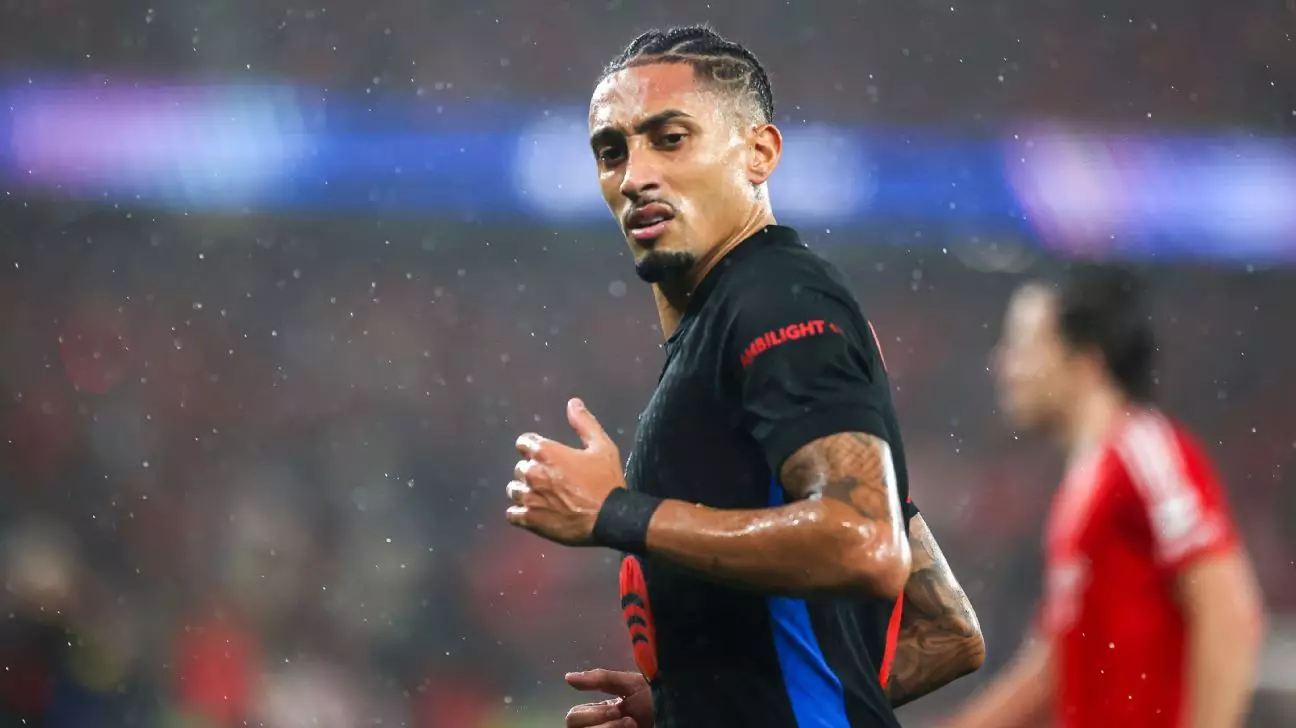In the cutthroat world of professional football, few aspects are as daunting as an overflowing fixture list. Barcelona’s coach, Hansi Flick, has recently voiced his unease over the current situation, where the team is tasked with a daunting run of seven matches within the span of just twenty days. This grueling slate of games comes immediately after an international break and raises vital questions regarding player welfare, tactical readiness, and overall team performance. It isn’t merely a number of games piled on the calendar; it symbolizes a veritable test of endurance and strategic planning that could define Barcelona’s season.
The challenges faced by Barcelona are compounded by their lack of key players. Raphinha and Ronald Araújo are sidelined after returning from international duty. Their absence is particularly critical, as both players have become integral to the team’s style of play. Flick’s frustration speaks volumes about the potential impact of such losses, especially when the stakes are high in both domestic and continental competitions. The fallout from missing these players cannot be ignored as it threatens to destabilize a carefully constructed squad.
The Weight of External Factors
Flick’s remarks encapsulate more than just personal grievance; they shine a light on broader systemic issues in football, where clubs often face scheduling pressures imposed by governing bodies like UEFA and FIFA. The varying treatment of leagues and clubs leads to disparities that can affect the integrity of competitions. Flick’s lament about La Liga’s insistence on immediate fixtures post-international breaks raises an interesting point about player recovery and how necessary it is for peak performance in matches that often carry the weight of significant points and pride.
European football is notorious for its grueling calendar, yet the expectation that players should seamlessly transition from national duties back to club responsibilities without sufficient time for recovery is unrealistic. Flick’s concerns pose a valid challenge to the status quo. It begs the question: why aren’t the governing bodies mandating longer recovery periods for international players returning to club football?
Strategic Maneuvering: Adapting to Adversity
Despite the daunting circumstances, Flick approaches the situation with a tactical mindset, demonstrating a resilience that goes beyond mere frustration. By canceling the players’ scheduled days off post-international break, he has prioritized preparation and team cohesion. This highlights Flick’s philosophy as a modern manager: sometimes, the collective goal must take precedence over individual recovery to achieve a larger vision.
However, his approach is fraught with risks. His choices may strain player morale or lead to burnout if they are not balanced effectively with well-timed rest. It remains to be seen whether this gamble will pay off for Barcelona as they brace for the immediate clash with Osasuna, an encounter that is more than just a match; it is an opportunity to create a cushion against rivals such as Real Madrid in La Liga.
The Road Ahead: Potential Pitfalls
As Barcelona proceeds with an intense succession of matches, they will need to be mindful of the impending pitfalls. Each matchup, including challenging fixtures against Atlético Madrid and Real Betis, calls for meticulous planning and flexible tactics. Flick’s reliance on players like Eric García and Iñigo Martínez to fill the void left by absentees is a tactical measure that reflects his ability to adapt under pressure. Yet, questions linger about depth and readiness. With injuries and international fatigue potentially lurking in the shadows, the depth of Barcelona’s squad will be tested like never before.
Preparing for encounters in both La Liga and the Champions League can be exhilarating, but it is equally perilous, as trophies and points hang in the balance. Flick’s foresight in engaging with physiotherapists and fitness coaches demonstrates a commitment to player welfare even amid demanding schedules. However, managing personalities and fostering a team spirit will be as important as any tactical lineup—especially when the weight of a club’s legacy feels heavier with every passing game.
In a world where every match could be the difference between glory and disappointment, Hansi Flick’s Barcelona stands at a crossroads. The ability to endure these fixtures and emerge triumphant hinges not only on the manager’s strategic prowess but also on the strength and spirit of the players who will have to muster every ounce of strength to rise to the occasion.

